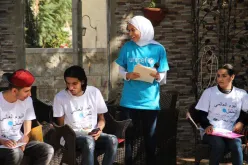There are around 3.2 million students in the Jordanian education system, including a large refugee population. As a result of ongoing conflicts in neighbouring Iraq and Syria, Jordan hosts one of the largest refugee populations in the Middle East. These include approximately 655,000 Syrian refugees. Children under 18 comprise nearly 50 per cent of this population.
Education systems had already been under strain because of double-shifting and other adjustments to school schedules to accommodate rising numbers of students. Subsequent increases in education spending and a consistent effort aimed to keep pace with the demand for nutrition, health and second-chance learning services that disadvantaged students need most.
The COVID-19 pandemic quickly increased the strains already upon educational systems - causing school closures, curfews, travel restrictions and a major public health concern. As a result, these systems have been transformed into remote working environments, with teaching and learning enabled through television and web-based distance education.
Advocates, however, have been raising alarm about enrollment and retention, because home-schooling and distance education were not common in Jordan prior to COVID-19. In fact, student enrollment and retention rates are lowest among refugee students, and, in some cases, have decreased to twenty per cent. Thus, a main challenge for the education system is to keep students engaged, and, simultaneously, ensure continued access to health, nutrition and supportive services for the most vulnerable.
National UN Volunteers Haya al Jamal (24) and Raghad Romman (25) are both Field Monitors with the UN Children's Fund (UNICEF) in Jordan. Haya supports the agency’s flagship Makani programme, through site visits, multi-sector referral services and feedback collected from refugee and Jordanian students. The referrals and feedback helped UNICEF reach malnourished and refugee students with a history of trauma.
Haya's visits to refugee camps were especially eye-opening, because of her family’s background. Indeed, Haya's grandparents were refugees and she draws inspiration from their experiences.
When schools closed, Haya continued to engage students and parents through phone surveys and assessments. Haya says, "students feel heard and supported because of the work we do."
Meanwhile, Raghad supports UNICEF’s Planning, Monitoring and Evaluation section, by undertaking site visits to monitor the performance of service providers and gather feedback from beneficiaries. Her work helps ensure that beneficiaries’ needs are met.
As part of her assignment, Raghad has supported data collection for an assessment of non-formal education systems. She says, "the data I help gather is meaningful, it captures the concerns of students." Raghad noted UNICEF and its partners used the data to develop best practices in distance education and she is motivated because it showed students, "COVID-19 will not keep them from developing skills."
UN Volunteer Jongmin Weon (27, Republic of Korea) also contributes to best practices in distance education. As an Education Associate with UNICEF's Middle East and North Africa (MENA) Education team, he helps teachers, parents and students access learning materials. Recently, Jongmin helped draft tips for families coping with the stress of the COVID-19 pandemic. Jongmin also supports the promotion of the Blue Dot, a new programme that aims to build resilience among children in the MENA region, through poetry, music, video, drawing and other art forms.
Students do not have to fall behind. We can all help them to keep learning. We must help them. --Jongmin Weon, UN Volunteer Education Associate with UNICEF's Middle East and North Africa regional office
Jongmin is also in a critical organizational role, supporting internal content management. He helps maintain webpages, collects, updates and stores information which staff throughout the MENA region rely upon for their information and communication needs.
UN Volunteer Yujin Kim (27, Republic of Korea) is also involved in UNICEF's economic engagement programme, which focuses on supporting youth with critical skills aimed at facilitating their transition from learning to earning.
As a Youth Programme Analyst, she helped plan vocational training, career counseling and business development initiatives with a particular focus on youth and women.
Yujin has been helping UNICEF modify these initiatives to the evolving COVID-19 context, supporting the transition of in-person learning to online learning, informing evaluation activities. As part of these activities, she has been working with a team to better understand ways in which distance education can be both relevant to the changing marketplace and adaptable - with in-person, online and offline features.
Yujin’s work contributes towards UNICEF providing a lifeline for families who lost their livelihoods or do not have reliable internet access, especially Syrian refugees - more than 80 per cent of whom live below the poverty line. In addition, she will soon be providing support to the Youth Learning Passport Platform - a digital platform recently launched by UNICEF in Jordan to support with youth accessing online and offline learning opportunities.
“The global pandemic requires all development partners to scale up and meet the needs of the most vulnerable, leaving no one behind,” says Jason Pronyk, the UNV Regional Manager for the Arab States. Indeed, meeting their needs requires creative ways to connect us all - and a 'new school' of education and training.

